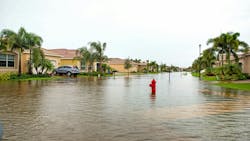ACCA urges homeowners and businesses to take caution before restarting systems in flood zones
Alexandria, VA – As millions of residents and businesses in the regions affected by Hurricanes Milton and Helene begin their recovery efforts, Air Conditioning Contractors of America (ACCA) is urging caution before restarting air conditioning systems.
Floodwaters can cause significant damage to HVACR systems, posing risks to both safety and health. To avoid these risks, homeowners and building managers are strongly advised to have their systems inspected by a licensed and qualified professional contractor.
ACCA recommends the following safety precautions to ensure a safe return to cooling systems post-flood:
Safeguard at-risk individuals
- In neighborhoods or buildings that lose power, check on vulnerable individuals, such as the elderly, who may be at heightened risk in homes without air conditioning.
- In hot and humid conditions, the elderly should be moved to an air-conditioned facility as quickly as possible.
- Facilities specializing in elderly care should not restart their HVACR systems until a licensed professional contractor has inspected them to ensure safety.
Do NOT restart HVACR systems in flooded areas
- Floodwaters may have infiltrated HVACR systems, leaving behind water, silt, and contaminants, including harmful bacteria and fungi.
- If restarted without proper cleaning, these contaminants could be spread through the ductwork, degrading indoor air quality.
- Waterlogged electrical components may short-circuit or burn out, leading to further damage or fire hazards.
Most flooded equipment will need replacement
- HVACR systems that have been exposed to floodwaters are at high risk of rust, mold, and premature electrical failure.
- The risk of bacteria and mold growth within systems that contain residual moisture is significant, making system replacement often the safest choice.
Some HVACR systems may be salvageable
- There are nationally recognized standards for cleaning and restoring HVAC systems, such as ACCA Standard 6 – *Restoring the Cleanliness of HVAC Systems for Residential and Commercial Applications.* This standard outlines the minimum requirements for safely cleaning HVAC systems post-flood.
Water heater replacement
- Flood-damaged water heaters should be replaced, regardless of the fuel type (gas, oil, or electric). Floodwater can corrode internal components, compromise insulation, and lead to future malfunctions.
- Replacing an older water heater with a newer, more efficient model can be a cost-effective decision in the long run.
Mercury contamination risk
- Some older HVACR equipment may contain mercury. Homeowners should not dispose of any unknown system components without consulting a professional contractor, as mercury exposure can be hazardous.
Contact a licensed HVACR professional
- Before attempting to restart any cooling or heating systems after a flood, it’s critical to seek the advice of a licensed HVACR professional. To find a local contractor, visit the ACCA Contractor Locator at acca.org/locator.
As a leader within the HVACR industry, ACCA extends deep condolences to those affected by Hurricanes Milton and Helene. Our thoughts are with those who have lost loved ones, and we express our profound gratitude to the first responders working tirelessly to assist impacted communities.
For more tips on HVACR recovery after flooding, visit ACCA at Home.
